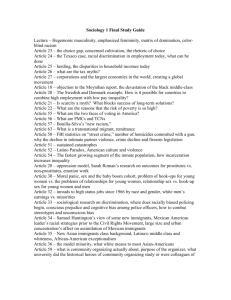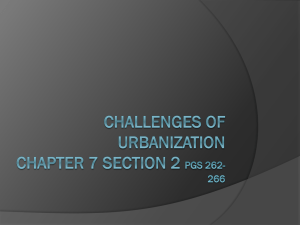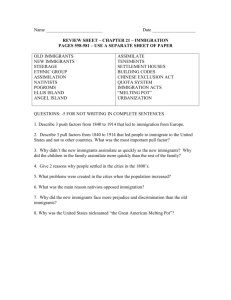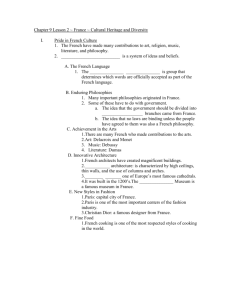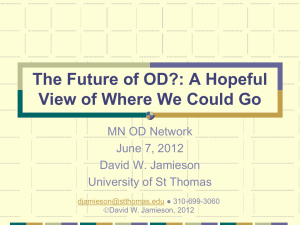english-only.doc
advertisement
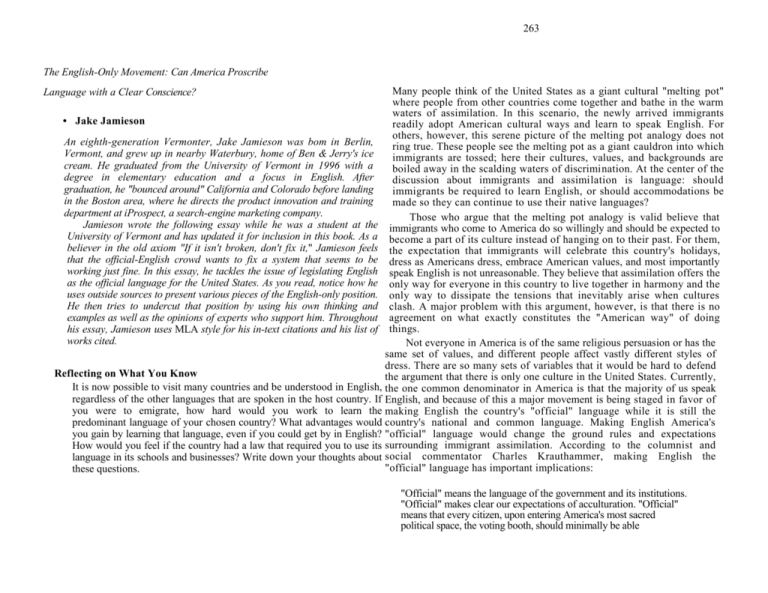
263 The English-Only Movement: Can America Proscribe Many people think of the United States as a giant cultural "melting pot" where people from other countries come together and bathe in the warm waters of assimilation. In this scenario, the newly arrived immigrants • Jake Jamieson readily adopt American cultural ways and learn to speak English. For others, however, this serene picture of the melting pot analogy does not An eighth-generation Vermonter, Jake Jamieson was bom in Berlin, ring true. These people see the melting pot as a giant cauldron into which Vermont, and grew up in nearby Waterbury, home of Ben & Jerry's ice immigrants are tossed; here their cultures, values, and backgrounds are cream. He graduated from the University of Vermont in 1996 with a boiled away in the scalding waters of discrimination. At the center of the degree in elementary education and a focus in English. After discussion about immigrants and assimilation is language: should graduation, he "bounced around" California and Colorado before landing immigrants be required to learn English, or should accommodations be in the Boston area, where he directs the product innovation and training made so they can continue to use their native languages? department at iProspect, a search-engine marketing company. Those who argue that the melting pot analogy is valid believe that Jamieson wrote the following essay while he was a student at the immigrants who come to America do so willingly and should be expected to University of Vermont and has updated it for inclusion in this book. As a become a part of its culture instead of hanging on to their past. For them, believer in the old axiom "If it isn't broken, don't fix it," Jamieson feels the expectation that immigrants will celebrate this country's holidays, that the official-English crowd wants to fix a system that seems to be dress as Americans dress, embrace American values, and most importantly working just fine. In this essay, he tackles the issue of legislating English speak English is not unreasonable. They believe that assimilation offers the as the official language for the United States. As you read, notice how he only way for everyone in this country to live together in harmony and the uses outside sources to present various pieces of the English-only position. only way to dissipate the tensions that inevitably arise when cultures He then tries to undercut that position by using his own thinking and clash. A major problem with this argument, however, is that there is no examples as well as the opinions of experts who support him. Throughout agreement on what exactly constitutes the "American way" of doing his essay, Jamieson uses MLA style for his in-text citations and his list of things. works cited. Not everyone in America is of the same religious persuasion or has the same set of values, and different people affect vastly different styles of dress. There are so many sets of variables that it would be hard to defend Reflecting on What You Know the argument that there is only one culture in the United States. Currently, It is now possible to visit many countries and be understood in English, the one common denominator in America is that the majority of us speak regardless of the other languages that are spoken in the host country. If English, and because of this a major movement is being staged in favor of you were to emigrate, how hard would you work to learn the making English the country's "official" language while it is still the predominant language of your chosen country? What advantages would country's national and common language. Making English America's you gain by learning that language, even if you could get by in English? "official" language would change the ground rules and expectations How would you feel if the country had a law that required you to use its surrounding immigrant assimilation. According to the columnist and language in its schools and businesses? Write down your thoughts about social commentator Charles Krauthammer, making English the "official" language has important implications: these questions. Language with a Clear Conscience? "Official" means the language of the government and its institutions. "Official" makes clear our expectations of acculturation. "Official" means that every citizen, upon entering America's most sacred political space, the voting booth, should minimally be able Jamieson / The English-Only Movement • 265 264 to identify the words president and vice president and county commissioner and judge. The immigrant, of course, has the right to speak whatever he wants. But he must understand that when he comes to the United States, swears allegiance, and accepts its bounty, he undertakes to join its civic culture. In English. (112) Many reasons are given to support the notion that making English the official language of the land is a good idea and that it is exactly what this country needs, especially in the face of the growing diversity of languages in metropolitan areas. Indeed, in a recent survey one Los Angeles school reported sixty different languages spoken in the homes of its students (National Education Association, par. 4). Supporters of English-only contend that all government communi- 4 cation must be in English. Because communication is absolutely necessary for democracy to survive, they believe that the only way to ensure the existence of our nation is to make sure a common language exists. Making English official would ensure that all government business, from ballots to official forms to judicial hearings, would have to be conducted in English. According to former senator and presidential candidate Bob Dole, "Promoting English as our national language is not an act of hostility but a welcoming act of inclusion." He goes on to state that while immigrants are encouraged to continue speaking their native languages, "thousands of children [are] failing to learn the language, English, that is the ticket to the 'American Dream'" (qtd. in Donegan 51). Political and cultural commentator Greg Lewis echoes Dole's sentiments when he boldly states, "To succeed in America . . . it's important to speak, read, and understand English as most Americans speak it. There's nothing cruel or unfair in that; it's just the way it is" (par. 5). For those who do not subscribe to this way of thinking, however, this type of legislation is anything but the "welcoming act of inclusion" that it is described to be. Many of them, like Myriam Marquez, readily acknowledge the importance of English but fear that "talking in Spanish—or any other language, for that matter—is some sort of litmus .test used to gauge American patriotism" ("Why and When" 512). Others suggest that anyone attempting to regulate language is treading dangerously close to the First Amendment and must have a hidden agenda of some type. Why, it is asked, make a language official when it is already firmly entrenched and widely used in this country without legislation to mandate it? According to language diversity advocate James Crawford, the answer is plain and simple: "discrimination." He states that "it is certainly more respectable to discriminate by language than by race" or ethnicity. He points out that "most people are not sensitive to language discrimination in this nation, so it is easy to argue that you're doing someone a favor by making them speak English" (qtd. in Donegan 51). Englishonly legislation has been criticized as bigoted, anti-immigrant, mean-spirited, and steeped in nativism by those who oppose it, and some go so far as to say that this type of legislation will not foster better communication, as is the claim, but will instead encourage a "fear of being subsumed by a growing 'foreignness' in our midst" (Underwood 65). For example, when a judge in Texas ruled that a mother was abusing her five-year-old girl by speaking to her only in Spanish, an uproar ensued. This ruling was accompanied by the statement that by talking to her daughter in a language other than English, the mother was "abusing that child and ... relegating her to the position of house maid." The National Association for Bilingual Education (NABE) condemned this statement for "labeling the Spanish language as abuse." The judge, Samuel C. Kiser, subsequently apologized to the housekeepers of the country, adding that he held them "in the highest esteem," but stood firm on his ruling (qtd. in Donegan 51). One might notice that he went out of his way to apologize to the housekeepers he might have offended but saw no need to apologize to the millions of Spanish speakers whose language had just been belittled in a nationally publicized case. This tendency of official-English proponents to put down other languages is one that shows up again and again, even though they maintain that they have nothing against other languages or the people who speak them. If there is no malice intended toward other languages, why is the use of any language other than English tantamount to lunacy according to an almost constant barrage of literature and editorial opinion? In a recent listing of the "New Year's Resolutions" of various conservative organizations, a group called U.S. English, Inc., stated that the U.S. government was not doing its job of convincing immigrants that they "must learn English to succeed in this country." Instead, according to Stephen Moore and his associates, "in a bewildering display of irrationality, the U.S. government makes it possible to vote, file a nix return, get married, obtain a driver's license, and become a U.S. ciii/en in many languages" (46). Now, according to this mindset, not only is speaking any language other than English abusive, but it is also irrational and bewildering. What is this world coming to when people want to speak and make transactions in their native language? Why do they refuse to change and become more like us? Why can't immigrants see that speaking English is quite simply the right way to go? These and many other questions like them are implied by official-English proponents when they discuss the issue. Conservative attorney David Price argues that official-English 9 legislation is a good idea because most English-speaking Americans prefer "out of pride and convenience to speak their native language on the job" (A13). This statement implies not only that the pride and convenience of non-English-speaking Americans is unimportant but that their native tongues are not as important as English. The scariest prospect of all is that this opinion is quickly gaining popularity all around the country. It appears to be most prevalent in areas with high concentrations of Spanish-speaking residents. To date, a number of official-English bills and one amendment to the 10 Constitution have been proposed in the House and Senate. There are more than twenty-seven states—including Missouri, North Dakota, Florida, Massachusetts, California, Virginia, and New Hampshire— that have made English their official language, and more are debating the issue every day. An especially disturbing fact about this debate— and it was front and center in 2007 during the discussions and protests about what to do with America's 12.5 million illegal immigrants—is that official-English laws always seem to be linked to anti-immigration legislation, such as proposals to limit immigration or to restrict govern ment benefits to immigrants. Although official-English proponents maintain that their bid for 11 language legislation is in the best interest of immigrants, the facts tend to show otherwise. University of Texas Professor Robert D. King strongly believes that "language does not threaten American unity." He recommends that "we relax and luxuriate in our linguistic richness and our traditional tolerance of language differences" (64). A decision has to be made in this country about what kind of message we will send to the rest of the world. Do we plan to allow everyone in this country the freedom of speech that we profess to cherish, or will we decide to reserve it only for those who speak English? Will we hold firm to ou^belief that everyone is deserving of life, liberty, and the pursuit of happiness in this country? Or will we show the world that we believe in these things only when they pertain to ourselves and people like us? "The irony," as Hispanic columnist Myriam Marquez observes, "is that English-only laws directed at government have done little to change the inevitable multicultural flavor of America" ("English-Only Laws" A10). ;,;, Works Cited Donegan, Craig. "Debate over Bilingualism: Should English Be the Nation's Official Language?" CQ Researcher 19 Jan. 1996: 51-71. Print. King, Robert D. "Should English Be the Law?" The Atlantic Monthly Apr. 1997: 55-64. Print. Krauthammer, Charles. "In Plain English: Let's Make It Official." Time 12 June 2006: 112. Print. Lewis, Greg. "An Open Letter to Diversity's Victims." WashingtonDispatch.com. 12 Aug. 2003. Web. 15 May 2008. Marquez, Myriam. "English-Only Laws Serve to Appease Those Who Fear the Inevitable." Orlando Sentinel 10 July 2000: A10. Print. "Why and When We Speak Spanish in Public." Models for Writers. 10th ed. Ed. Alfred Rosa and Paul Eschholz. Boston: Bedford, 2010. 511-13. Print. Moore, Stephen, et al. "New Year's Resolutions." National Review 29 Jan. 1996: 46-48. Print. National Education Association. "NEA Statement on the Debate over English Only." Teacher's College, U of Nebraska, Lincoln. 27 Sept. 1999. Web. 15 May 2008. Underwood, Robert L. "At Issue: Should English Be the Official Language of the United States?" CQ Researcher 19 Jan. 1996: 65. Print. Thinking Critically about This Reading Jamieson claims that "there are so many sets of variables that it would be hard to defend the argument that there is only one culture in the United States" (paragraph 3). Do you agree with him, or do you see a dominant American culture with many regional variations? Explain. Questions for Study and Discussion 1. What question does Jamieson seek to answer in his paper? How does he answer this question? 2. How does Jamieson respond to the people who argue that the melt ing pot analogy is valid? Do you agree with his counterargument? 3. Former senator Bob Dole believes that English "is the ticket to the 'American Dream'" (4). In what ways can it be considered the ticket? 4. For what purpose does Jamieson quote Greg Lewis in paragraph 4? What would have been lost had he dropped the Lewis quotation? Explain.



